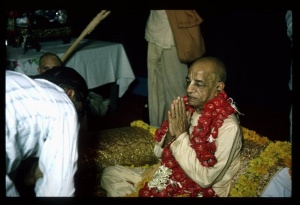SB 5.1.20: Difference between revisions
m (1 revision(s)) |
No edit summary |
||
| Line 1: | Line 1: | ||
{{info | {{info | ||
|speaker= | |speaker=Śukadeva Gosvāmī | ||
|listener=King | |listener=King Parīkṣit | ||
}} | }} | ||
[[Category:Srimad-Bhagavatam - Canto 05 Chapter 01]] | |||
[[Category:Bhagavatam Verses Spoken by Sukadeva Gosvami - Vanisource|050120]] | |||
<div style="float:left">'''[[Srimad-Bhagavatam]] - [[SB 5|Fifth Canto]] - [[SB 5.1: The Activities of Maharaja Priyavrata|Chapter 1: The Activities of Mahārāja Priyavrata]]'''</div> | |||
<div style="float:right">[[File:Go-previous.png|link=SB 5.1.19]] '''[[SB 5.1.19]] - [[SB 5.1.21]]''' [[File:Go-next.png|link=SB 5.1.21]]</div> | |||
{{RandomImage}} | |||
==== TEXT 20 ==== | ==== TEXT 20 ==== | ||
<div | <div class="verse"> | ||
śrī-śuka uvāca | :śrī-śuka uvāca | ||
iti samabhihito mahā-bhāgavato bhagavatas tri-bhuvana-guror anuśāsanam ātmano laghutayāvanata-śirodharo bāḍham iti sabahu-mānam uvāha | :iti samabhihito mahā-bhāgavato bhagavatas tri-bhuvana-guror anuśāsanam ātmano | ||
:laghutayāvanata-śirodharo bāḍham iti sabahu-mānam uvāha | |||
</div> | </div> | ||
| Line 14: | Line 21: | ||
==== SYNONYMS ==== | ==== SYNONYMS ==== | ||
<div | <div class="synonyms"> | ||
śrī-śukaḥ | ''śrī-śukaḥ uvāca''—Śrī Śukadeva Gosvāmī said; ''iti''—thus; ''samabhihitaḥ''—completely instructed; ''mahā-bhāgavataḥ''—the great devotee; ''bhagavataḥ''—of the most powerful Lord Brahmā; ''tri-bhuvana''—of the three worlds; ''guroḥ''—the spiritual master; ''anuśāsanam''—the order; ''ātmanaḥ''—of himself; ''laghutayā''—because of inferiority; ''avanata''—bowed down; ''śirodharaḥ''—his head; ''bāḍham''—yes, sir; ''iti''—thus; ''sa-bahu-mānam''—with great respect; ''uvāha''—carried out. | ||
</div> | </div> | ||
| Line 21: | Line 28: | ||
==== TRANSLATION ==== | ==== TRANSLATION ==== | ||
<div | <div class="translation"> | ||
Śrī Śukadeva Gosvāmī continued: After thus being fully instructed by Lord Brahmā, who is the spiritual master of the three worlds, Priyavrata, his own position being inferior, offered obeisances, accepted the order and carried it out with great respect. | Śrī Śukadeva Gosvāmī continued: After thus being fully instructed by Lord Brahmā, who is the spiritual master of the three worlds, Priyavrata, his own position being inferior, offered obeisances, accepted the order and carried it out with great respect. | ||
</div> | </div> | ||
| Line 28: | Line 35: | ||
==== PURPORT ==== | ==== PURPORT ==== | ||
<div | <div class="purport"> | ||
Śrī Priyavrata was the grandson of Lord Brahmā. Therefore according to social etiquette, his position was inferior. It is the duty of the inferior to carry out the order of the superior with great respect. Priyavrata therefore immediately said, "Yes, sir. I shall carry out your order." Priyavrata is described as a mahā-bhāgavata, a great devotee. The duty of a great devotee is to carry out the order of the spiritual master, or the spiritual master of the spiritual master in the paramparā system. As described in Bhagavad-gītā ([[BG 4.2]]), evaṁ paramparā prāptam: one has to receive the instructions of the Supreme Lord through the disciplic chain of spiritual masters. A devotee of the Lord always considers himself a servant of the servant of the servant of the Lord ([[CC Madhya 13.80]]). | Śrī Priyavrata was the grandson of Lord Brahmā. Therefore according to social etiquette, his position was inferior. It is the duty of the inferior to carry out the order of the superior with great respect. Priyavrata therefore immediately said, "Yes, sir. I shall carry out your order." Priyavrata is described as a ''mahā-bhāgavata'', a great devotee. The duty of a great devotee is to carry out the order of the spiritual master, or the spiritual master of the spiritual master in the ''paramparā'' system. As described in ''Bhagavad-gītā'' ([[BG 4.2 (1972)|BG 4.2]]), ''evaṁ paramparā prāptam'': one has to receive the instructions of the Supreme Lord through the disciplic chain of spiritual masters. A devotee of the Lord always considers himself a servant of the servant of the servant of the Lord ([[CC Madhya 13.80]]). | ||
</div> | </div> | ||
__NOTOC__ | |||
<div style="float:right; clear:both;">[[File:Go-previous.png|link=SB 5.1.19]] '''[[SB 5.1.19]] - [[SB 5.1.21]]''' [[File:Go-next.png|link=SB 5.1.21]]</div> | |||
__NOTOC__ | |||
__NOEDITSECTION__ | |||
Revision as of 10:58, 5 May 2021

A.C. Bhaktivedanta Swami Prabhupada
TEXT 20
- śrī-śuka uvāca
- iti samabhihito mahā-bhāgavato bhagavatas tri-bhuvana-guror anuśāsanam ātmano
- laghutayāvanata-śirodharo bāḍham iti sabahu-mānam uvāha
SYNONYMS
śrī-śukaḥ uvāca—Śrī Śukadeva Gosvāmī said; iti—thus; samabhihitaḥ—completely instructed; mahā-bhāgavataḥ—the great devotee; bhagavataḥ—of the most powerful Lord Brahmā; tri-bhuvana—of the three worlds; guroḥ—the spiritual master; anuśāsanam—the order; ātmanaḥ—of himself; laghutayā—because of inferiority; avanata—bowed down; śirodharaḥ—his head; bāḍham—yes, sir; iti—thus; sa-bahu-mānam—with great respect; uvāha—carried out.
TRANSLATION
Śrī Śukadeva Gosvāmī continued: After thus being fully instructed by Lord Brahmā, who is the spiritual master of the three worlds, Priyavrata, his own position being inferior, offered obeisances, accepted the order and carried it out with great respect.
PURPORT
Śrī Priyavrata was the grandson of Lord Brahmā. Therefore according to social etiquette, his position was inferior. It is the duty of the inferior to carry out the order of the superior with great respect. Priyavrata therefore immediately said, "Yes, sir. I shall carry out your order." Priyavrata is described as a mahā-bhāgavata, a great devotee. The duty of a great devotee is to carry out the order of the spiritual master, or the spiritual master of the spiritual master in the paramparā system. As described in Bhagavad-gītā (BG 4.2), evaṁ paramparā prāptam: one has to receive the instructions of the Supreme Lord through the disciplic chain of spiritual masters. A devotee of the Lord always considers himself a servant of the servant of the servant of the Lord (CC Madhya 13.80).